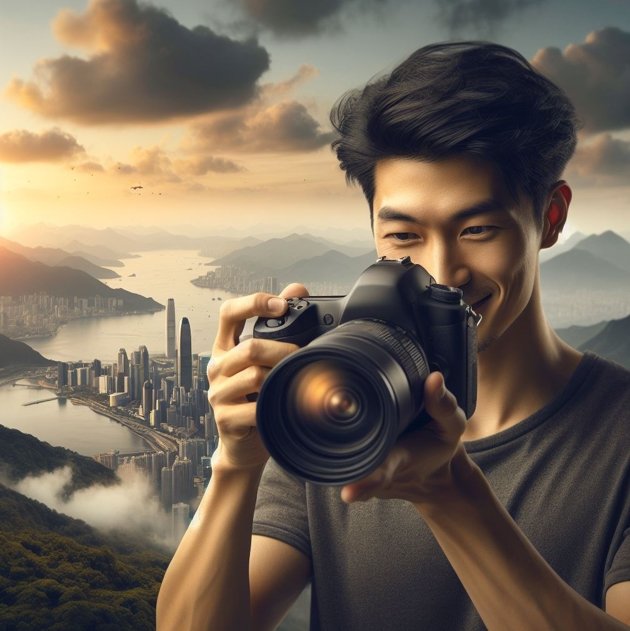If you are interested in photography, you have probably heard of DSLR cameras. But what exactly are they and how do they differ from other types of cameras? In this article, you will learn everything you need to know about DSLR cameras, including their advantages, disadvantages, features, and functions. You will also discover some of the best DSLR cameras for beginners, enthusiasts, and professionals. By the end of this article, you will be able to answer the question: What is a DSLR camera and why do you need one?
What Does DSLR Stand For?
DSLR stands for Digital Single-Lens Reflex. It is a type of camera that uses a mirror to reflect light through a lens to an optical viewfinder. When the shutter is pressed, the mirror moves out of the way, and the reflected light hits the image sensor to take a picture. This is different from mirrorless cameras, where the light goes directly to the image sensor, and the photographer sees what they are shooting via a rear LCD screen or an electronic viewfinder.
What Are the Benefits of DSLR Cameras?
There are many benefits of using a DSLR camera, such as:
- Image quality
DSLR cameras have large image sensors that can capture more light and detail than smaller sensors found in point-and-shoot or smartphone cameras. This results in higher resolution, lower noise, and better dynamic range. DSLR cameras also allow you to shoot in RAW format, which gives you more control over editing your images. - Lens versatility
DSLR cameras let you change lenses depending on your shooting needs. You can choose from a wide range of lenses, from wide-angle to telephoto, from macro to fisheye, and from prime to zoom. You can also use lenses from different brands or adapt vintage lenses with adapters. Changing lenses can give you different perspectives, effects, and creative possibilities. - Speed and performance
DSLR cameras have fast autofocus systems that can track moving subjects and lock focus in low-light situations. They also have high burst rates that can capture multiple frames per second, which is useful for action or wildlife photography. DSLR cameras have long battery life that can last for hundreds or thousands of shots, depending on the model and usage. - Optical viewfinder
DSLR cameras have optical viewfinders that show you exactly what the lens sees, without any lag or distortion. Optical viewfinders can help you compose your shots, adjust your settings, and focus manually. They can also save battery power, as you don’t need to use the LCD screen all the time. - Durability and reliability
DSLR cameras are built to withstand harsh conditions and rough handling. They have sturdy bodies, weather-sealing, and dust and moisture resistance. They can also work in extreme temperatures and altitudes. DSLR cameras are less prone to malfunctioning or breaking down than other types of cameras.
FAQs About DSLR Cameras
Here are some of the most frequently asked questions about DSLR cameras and their answers:
- What is the difference between DSLR and SLR cameras?
- SLR stands for Single-Lens Reflex, and it is a type of camera that uses a mirror to reflect light through a lens to an optical viewfinder. SLR cameras use film to record images, while DSLR cameras use digital sensors to record images. DSLR cameras are the digital version of SLR cameras, and they have the same basic mechanism and principle, but with some additional features and functions.
- What is the difference between DSLR and mirrorless cameras?
- Mirrorless cameras are cameras that do not have a mirror or an optical viewfinder. They use an electronic viewfinder or a rear LCD screen to show what the lens sees. Mirrorless cameras are smaller, lighter, and quieter than DSLR cameras, but they have shorter battery life, slower autofocus, and less lens variety. Mirrorless cameras are newer and more innovative than DSLR cameras, and they have some advantages and disadvantages over them.
- What is the best DSLR camera for beginners?
- There is no definitive answer to this question, as different DSLR cameras have different features, functions, and prices that may suit different beginners. However, some of the factors that you may want to consider when choosing a DSLR camera for beginners are ease of use, affordability, weight, image quality, speed, performance, and compatibility. You may also want to read reviews, compare specifications, and try out different models before making a decision.
- What is the best DSLR camera for video?
- Again, there is no definitive answer to this question, as different DSLR cameras have different video capabilities and qualities that may suit different videographers. However, some of the factors that you may want to consider when choosing a DSLR camera for video are resolution, frame rate, autofocus, stabilization, audio, and connectivity. You may also want to look for DSLR cameras that have features such as 4K video, slow motion, time-lapse, and external microphone and headphone jacks.
- What is the best DSLR camera for wildlife photography?
- Wildlife photography is a challenging and rewarding genre of photography that requires a DSLR camera that can capture fast-moving and distant subjects in various lighting and weather conditions. Some of the factors that you may want to consider when choosing a DSLR camera for wildlife photography are image quality, speed, performance, autofocus, burst rate, battery life, durability, and reliability. You may also want to look for DSLR cameras that have features such as high ISO, low noise, weather-sealing, and dual card slots.
DSLR cameras represent the pinnacle of photographic excellence, offering unmatched performance, versatility, and creative control to photographers of all levels. Whether you’re capturing breathtaking landscapes, documenting precious moments, or pursuing artistic endeavors, a DSLR camera empowers you to unleash your creativity and bring your vision to life like never before. So why wait? Dive into the world of DSLR photography and embark on an unforgettable journey of visual storytelling.
